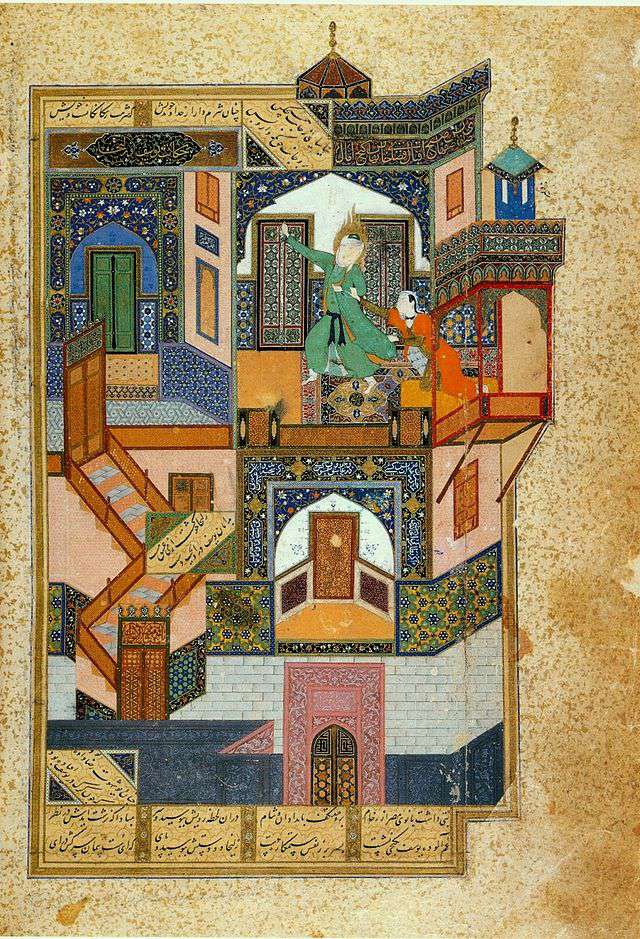FWP:
SETS == GENERATORS; IZAFAT; SYMMETRY
DREAMS: {3,3}
'UNION': {5,2}
For background see S. R. Faruqi's choices. For more on Ghalib's unpublished verses, see the discussion in {4,8x}. This verse is from a different, unpublished, formally identical ghazal,, and is included for comparison. On the presentation of verses from unpublished ghazals like this one along with formally identical divan ghazals, see {145,5x}.
Thanks to the multivalence of the iẓāfat in the first line, vaṣl-e ġhair can mean: 'union with another' (something that the speaker might be urged to consider for himself); or 'the union of an Other' (somebody else's sex life); or 'a strange/foreign/bad union'. Since the phrase refers to a story being told by the speaker's friends in order to divert him or cheer him up, the range of possible narratives would be extremely wide.
In the second line, we encounter an 'A,B' construction that equates the speaker's own 'enchantment of sleep/dream' with the 'dream of Zulaikha'. It's tempting, and quite plausible, to take the story of Zulaikha's dream as the story the speaker's friends have been telling him in the first line. But within the grammar of the verse, it's not at all necessary. The friends could have been telling some other story entirely, and the speaker then simply uses Zulaikha's dream to illustrate a point he's trying to make about their narrative.
For the story of the 'dream of Zulaikha', see {194,5}; it's also alluded to and discussed in {145,9x}. It's such a rich and narratively complex story, with so many elements of chastity and sensuality, arrogance and humility, dream and reality, failure and success, that it's not at all clear what elements of the story are being invoked here.
Similarly, the iẓāfat in afsūn-e ḳhvāb opens up an array of possibilities. Is it a magic spell that creates a sleep/dream, or that is created by one, or that itself 'is' one? Not only is the connection ambiguous, but the two parts themselves are complex in their own ways. And is the afsūn the enjoyable, desirable 'enchantment' of listening to a story, or is it the frightening grip of nightmare and bad magic ('sorcery, witchcraft')?
Obviously, the whole range of permutations is almost hopelessly wide. The longer one considers this verse, the more its shape keeps changing, and new possibilities constantly emerge. It's too richly multivalent-- does it leave us with a sense of looseness of structure?
Only in retrospect do we savor the initial vocative plural ʿazīzo , which at first seems a bit unusual (how often does the wretched lover actually have a whole group of dear friends around him?). Only when we hear the second verse do we pick up on the reference: Zulaikha's husband is called the Aziz (Qur'an 12:30). Of course the wordplay is fun in itself, but is there also a sense in which the speakers 'dear friends' are playing the cat's-paw role of the Aziz? (And it's clever that they're plural, because only the plural vocative is instantly and conveniently recognizable as such.)
There are also the beautiful rhythm and sound effects of the second line, in which the juxtaposition afsūn-e ḳhvāb with afsānah-e ḳhvāb not only pleases our ears, but also leads us to wonder whether the afsūn and the afsānah are being compared, or contrasted; for more such verses, see {15,18x}.

Zamin:
Companions and friends want to put me to sleep (divert me) with the mention of union with the friend/beloved. But their magic spell for sleep, with regard to me becomes the story of the 'dream of Zulaikha', and in the ardor for listening to a story my sleep is banished. Mirza wanted to change this half-Persian into Urdu, but ġhair has infiltrated into it. What-- to mention to the lover, the beloved's union with some Other-- is this the work of dear ones, or of enemies?! And will that mention be to amuse him, or to inflame him [with jealousy/envy]?!
== Zamin, pp. 361-362